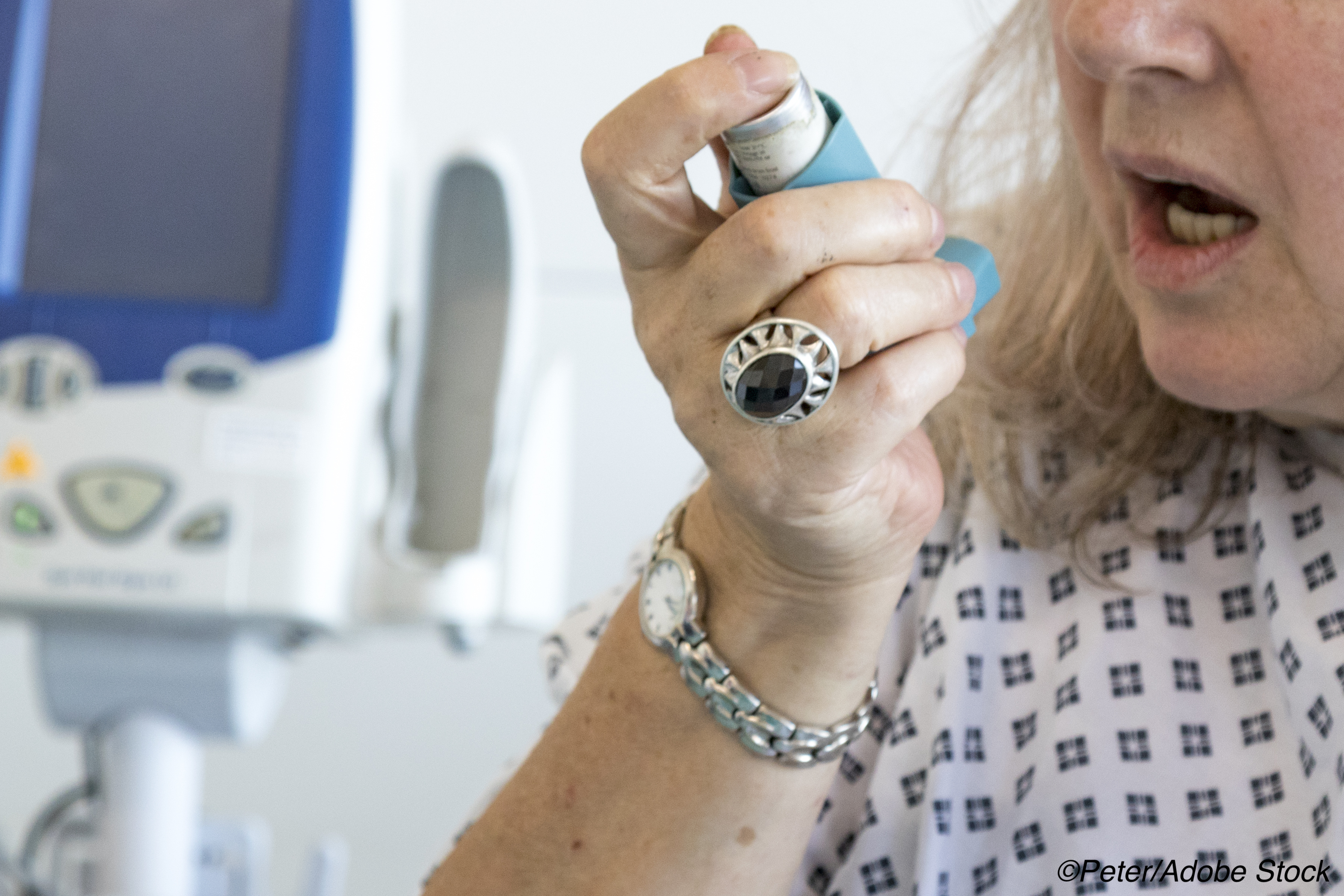 Among patients with COPD or asthma, treatment with an inhaled corticosteroid (ICS) showed no demonstrable benefit or harm with regard to Covid-19 mortality in an observational analysis of electronic primary care records involving more than 1 million patients in the United Kingdom.
Among patients with COPD or asthma, treatment with an inhaled corticosteroid (ICS) showed no demonstrable benefit or harm with regard to Covid-19 mortality in an observational analysis of electronic primary care records involving more than 1 million patients in the United Kingdom.
While the risk of Covid-19-related death was greater in certain COPD and asthma patients treated with ICS, compared to those not treated with an ICS, sensitivity analysis attributed this increase in risk to small health differences among patients who were and were not prescribed inhaled corticosteroids.
The study findings, published recently online in The Lancet, do not support the conclusion that patients with the chronic airway and lung diseases should alter their ICS treatments during the Covid-19 pandemic, wrote researcher Anna Schultze, PhD, of the London School of Hygiene & Tropical Medicine, and colleagues.
“These results do not support any change to the current clinical guidelines for the routine treatment of people with COPD or asthma with ICS during outbreaks of SARS-CoV-2 infection,” they wrote.
They added that previous findings offer conflicting results about the impact of ICS use on Covid-19 mortality.
“The orally or intravenously administered steroid dexamethasone has been shown to reduce the risk of death in people with severe Covid-19,” they wrote. “Conversely, although ICSs have low systemic absorption, in people with COPD they have been associated with an increased risk of developing pneumonia and other systemic steroid-related adverse effects. ICS use has also been shown to impair type 1 interferon production, potentially increasing the risk of viral infections.”
Their own systematic review exploring the role of ICS in SARS-CoV-2 outcomes, as well as other coronaviruses, turned up no relevant studies addressing the question.
“To answer this question, we aimed to explore the association between current ICS use and Covid-19-related death among people with COPD and asthma using the OpenSAFELY platform, which runs across linked primary care electronic health records (EHR) data for approximately 40% of the population of England,” they wrote.
The index date (start of follow-up) for both the COPD and asthma cohorts was March 1, 2020, and follow-up lasted until May 6, 2020.
Patients in the COPD cohort were eligible if they were age 35 years or older, had COPD, were a current or former smoker, and were prescribed an ICS or long-acting β agonist plus long-acting muscarinic antagonist (LABA-LAMA) as combination therapy within the 4 months before the index date.
Patients in the asthma cohort included adults (18+ years) diagnosed with asthma within three years of the index date prescribed an ICS or short-acting β agonist (SABA) only within the 4 months before the index date.
Covid-19-related death outcomes were compared between people prescribed an ICS and those prescribed alternative respiratory medications: ICSs versus LABA-LAMA for the COPD cohort, and low-dose or medium-dose and high-dose ICSs versus SABAs only in the asthma cohort.
Cox regression models were used to estimate hazard ratios (HRs) and 95% CIs for the association between exposure categories and the outcome in each population, adjusted for age, sex, and all other prespecified covariates.
The data search identified 148,557 people with COPD and 818,490 with asthma who were given relevant respiratory medications in the 4 months before the index date.
Among the main study findings:
- COPD patients prescribed ICSs were at increased risk of Covid-19-related death compared with those prescribed LABA–LAMA combinations (adjusted HR 1.39 [95% CI 1.10-1.76]).
- Compared with asthma patients prescribed SABAs only, asthma patients prescribed high-dose ICS were at an increased risk of death (1.55 [1.10-2.18]), whereas those given a low or medium dose were not (1.14 [0.85-1.54]).
- Sensitivity analyses showed that the observed apparent harmful association could “be explained by relatively small health differences between people prescribed ICS and those not prescribed ICS that were not recorded in the database (e value lower 95% CI 1.43),” the researchers wrote.
“The totality of the data presented here, including our sensitivity analyses, do not indicate that regular ICS therapy for asthma or COPD either decreases or increases risk of death from Covid-19 and do not provide evidence to support adjustments in ICS therapy among patients with asthma or COPD during outbreaks of SARS-CoV-2,” Schultze and colleagues wrote.
Significant study limitations cited by the researchers involved possible confounding by indication “due to unmeasured or imperfectly defined potential confounding variables,” a lack of secondary care data, and the inability to explore the relative impact of ICS use on SARS-CoV-2 severe disease and death.
In addition, the study did not address the role of ICS use in treating Covid-19 among patients without asthma or COPD, which is the subject of 2 ongoing clinical trials (NCT04331054, NCT04330586).
In an editorial published with the study, Professors Dave Singh, of the University of Manchester and David M.G. Halpin, of the University of Exeter, UK, wrote that the analysis by Schultze and colleagues “provides some insights, but not conclusive answers, about whether ICS use impacts Covid-19 outcomes.”
“Overall, the analysis is confounded and does not provide definite answers that patients and clinicians need, although it hints that ICS use does not provide a strong protective effect,” they wrote.
They concluded that while the impact of regular ICS treatment on the risk of death from Covid-19 is still unclear, the harms of stopping the treatment in patients with COPD or asthma who benefit from it are well documented.
“Until more information is available, patients with asthma and COPD who are stable while using ICS must continue on their treatment during the ongoing Covid-19 pandemic,” they wrote.
-
Among patients with COPD or asthma, treatment with an inhaled corticosteroid (ICS) showed no demonstrable benefit or harm with regard to Covid-19 mortality in an observational analysis.
-
The study findings do not support the conclusion that patients with the chronic airway and lung diseases should alter their ICS treatments during the Covid-19 pandemic.
Salynn Boyles, Contributing Writer, BreakingMED™
This research was funded by the UK Medical Research Council.
Lead researcher Anna Schultze reported being employed by London School of Hygiene & Tropical Medicine on a fellowship sponsored by GlaxoSmithKline. Principal researcher Ben Goldacre reported receiving research funding from Health Data Research UK, the Laura and John Arnold Foundation, the Wellcome Trust, the National Institute for Health Research (NIHR) Oxford Biomedical Research Centre, the NHS NIHR School of Primary Care Research, the Mohn-Westlake Foundation, the Good Thinking Foundation, the Health Foundation, and WHO; all DataLab staff are supported by BG’s grants on this work; and receives personal income from speaking and writing for lay audiences on the misuse of science.
Editorial writer Dave Singh reported receiving personal fees from AstraZeneca, Boehringer Ingelheim, Chiesi, Cipla, Genentech, GlaxoSmithKline, Glenmark, Gossamerbio, Menarini, Mundipharma, Novartis, Peptinnovate, Pfizer, Pulmatrix, Theravance, and Verona outside of the submitted work. Editorial writer David Halpin reported personal fees from AstraZeneca, Chiesi, GlaxoSmithKline, Pfizer, and Sanofi, and personal fees and non-financial support from Boehringer Ingelheim and Novartis outside of the submitted work.
Cat ID: 154
Topic ID: 89,154,254,930,190,926,192,927,151,928,154,929,925,934


